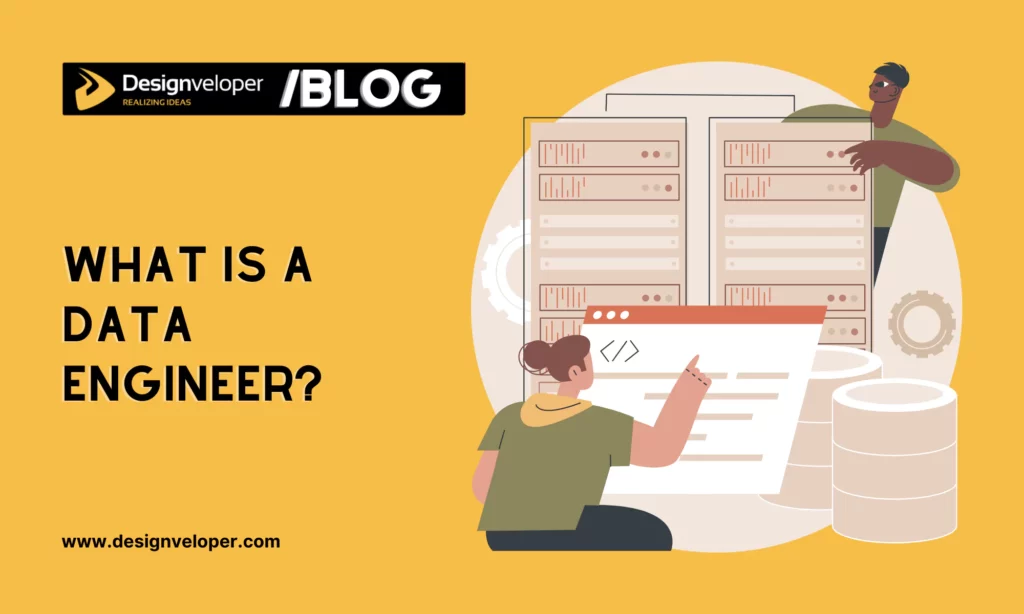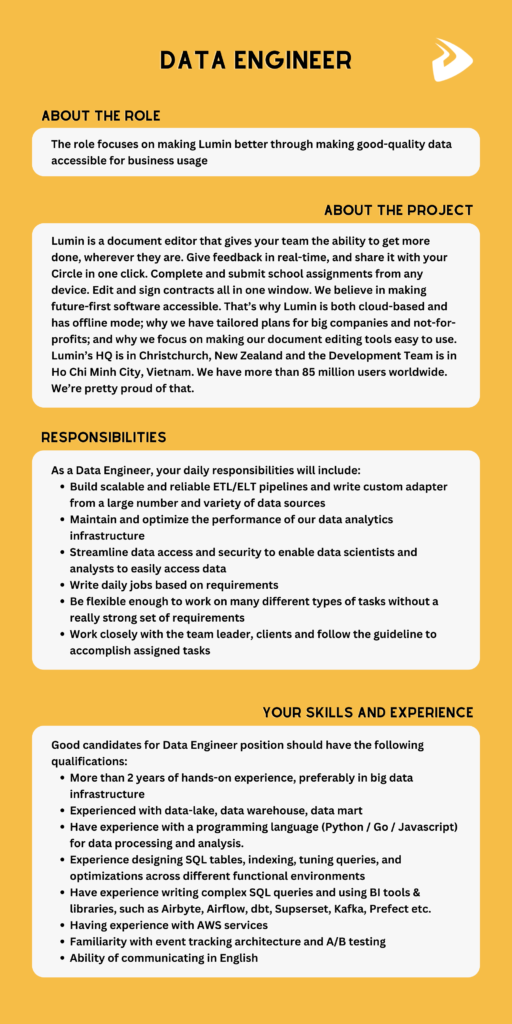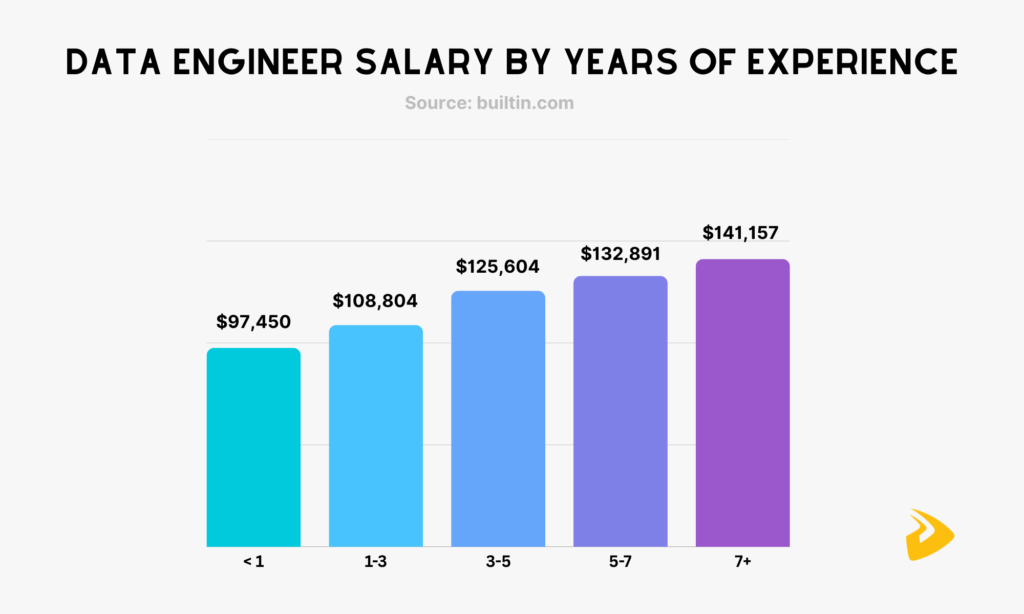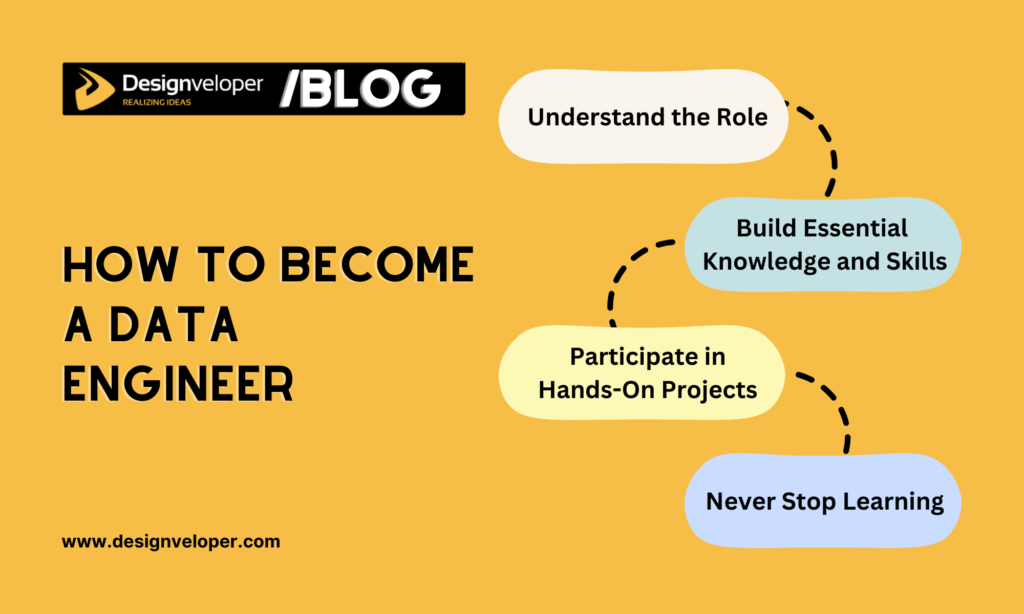


Have you ever wondered what a data engineer job description might look like? Why is this position crucial in today’s organizations? Do you have any chance to pursue this career? Let’s find the answers in this article with Designveloper!

A data engineer is responsible for building, managing, and maintaining the systems that collect, store, and transform big data. Without these systems, anyone in a company may find themselves challenged with retrieving data to gain meaningful insights. That’s why a data engineer is a very essential part of a company. They work in the background to ensure data flows smoothly from sources (in raw formats) to destinations (in usable formats for analysis).
Each company can assign slightly distinct responsibilities to data engineers. This depends on the projects they participate in. But generally, their duties revolve around the following tasks:
Similarly, each company may have different requirements for a data engineer’s skills and experience in their job descriptions. However, an engineer is often required to have common skills. They often cover technical knowledge, soft skills, and hands-on experience.
To help you better understand how a data engineer job description may look like in reality, let’s take a look at Designveloper’s example:
Here, we’re recruiting excellent data engineers for our Lumin project. In the job description, we detailed the role, the Lumin project, and core responsibilities if a candidate has an opportunity to work with us. We also highlighted the essential skills and experience we need from the candidate.

So, are you interested in this Data Engineer position in Designveloper? Send us your CV and portfolio now!
Below are some common questions candidates may ask when learning about the data engineering position. If you want to pursue this career, don’t overlook these questions.
The answer is yes. According to the WEF (World Economic Forum) Report released in January 2025, data engineering is one of the most in-demand roles, especially in the IT Services industry. In particular, this profession records a global net growth of 32% from 2025 to 2030. There are many reasons behind the increasing demand for this position:
Companies now can generate data from any source. Especially with the rise of the IoT (Internet of Things) technology like sensors and wearable devices, they can collect large volumes of data in real-time. To store, manage, and process such big data effectively, there’s a growing demand for data engineers.
Companies across all fields are increasingly depending on data to make informed decisions. Be it to optimize operations, boost customer experiences, or forecast demands, data always plays a core role in strategic decisions. However, without data engineers, data can’t be processed, accessed, and ready for analysis.
Moreover, many companies now require real-time data processing to address specific tasks timely (e.g., suggesting personalized treatment plans). Data engineers play a key role in developing systems that can handle data in real-time.
There’s a growing adoption of cloud platforms like AWS, Azure, or Google Cloud. This has propelled an increasing need for skilled data engineers who can build, deploy, and maintain data systems in cloud environments.
As companies continue to depend on data to improve their strategies, the demand for data engineers remains high. This provides good job opportunities to those with the right expertise and skills.
Data engineering is one of the most lucrative roles. In the United States, a data engineer can earn an average base salary of $125,345 per year. According to our previous article, this position even pays higher than data analysts and data scientists.
Of course, this salary figure can vary depending on different factors.

Besides base salaries, data engineers often receive bonuses, equity options, and other benefits (e.g., health insurance).
Without coding knowledge, it’s tricky for you to become a data engineer. It’s because this position often requires a strong foundation in programming languages (e.g., Python or SQL). These coding languages help you write scripts to extract, convert, and load data effectively from different sources to a centralized platform.
Even other data engineering tasks like data cleaning and database management require your expertise in coding. For instance, you need to write custom scripts to tackle particular data issues or formats, hence maintaining data quality. Plus, due to vast volumes of data, a data engineer must depend on scripting languages to develop automated solutions that can process data efficiently without human intervention.
Due to the nature of data engineering work, you can hardly become a data engineer without coding. However, what if you still want to pursue this career with limited coding skills? In this case, we advise you to begin in similar roles that don’t require much coding knowledge, typically data analysts. Then, you can gain exposure to data engineering concepts and gradually learn coding through online resources (e.g. courses or boot camps).

If you want to become a data engineer from scratch, below are some steps you can take to embrace this journey:
Start by learning about the real-life responsibilities of a data engineer and possibly their projects. This helps you understand real-life demands and expectations for this position, which is helpful for setting up realistic goals.
This step lays the foundation for your journey toward becoming a data engineer. You need to build your knowledge of programming languages, cloud platforms, big data technologies (e.g., Hadoop or Spark), and data warehousing or data lakes.
To build such knowledge and practical skills, you can enroll in online courses, boot camps, or formal educational programs. Such learning platforms as Udemy, edX, or LinkedIn provide a variety of data engineering courses. You can consider specialized certifications from tech giants like AWS Certified Data Engineer or Google’s Professional Data Engineer.
Next, work on practical projects to apply your knowledge and gain hands-on experience.
This can involve developing personal projects that revolve around data manipulation and analysis, or contributing to open-source projects to learn from experienced fellows. These projects help enhance your portfolio, prove your skills to potential employers, and build your reputation in communities.
Further, you can look for volunteer or internship opportunities in companies that often use data. This will give you practical experience and excellent opportunities to network with specialists in the field.
The data engineering sector is continuously evolving. Therefore, stay updated with the latest technologies and trends by following industry leaders on social media, attending workshops or conferences, and reading blogs. Also, you can seek a mentor who may offer precious advice and guide you through your career journey.
Becoming a data engineer requires technical skills, practical experience, and a strong understanding of the data ecosystem. Further, candidates need to be dedicated and continuously learn to be successful on this career path. Through this article, you may better understand what a company’s data engineer job description may look like, coupled with key duties, skills, and salaries. For more interesting topics about data engineering, don’t forget to follow us on Facebook, X, and LinkedIn!














